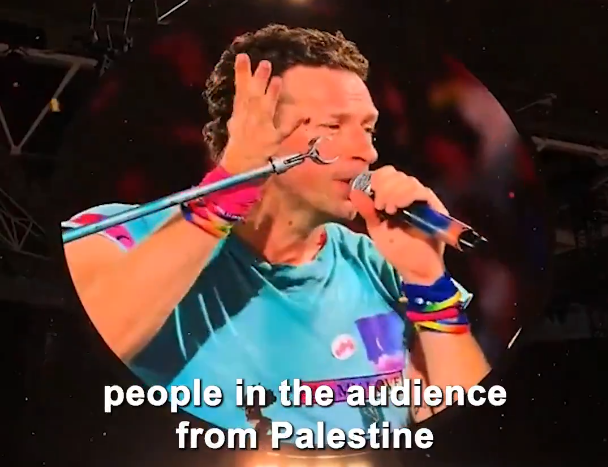By Danielle Arfin
At Coldplay’s sold-out Wembley concert on August 31, frontman Chris Martin invited two young women on stage. When they introduced themselves as being from Israel, the crowd responded with a mix of cheers and boos. At the piano, Martin appeared uncomfortable before addressing them in a way that many have described as mortifying.
“I’m very grateful that you’re here, as humans, and I am treating you as equal humans on earth, regardless of where you come from or don’t come from,” Martin said. He then added, “Although it’s controversial maybe, I also want to welcome people in the audience from Palestine because… out of the belief that we’re all equal humans.” The line about Palestine drew loud applause, according to Ynet News.
The two fans, Avia and Tal, later explained in an interview that they had briefly considered saying they were from Malta rather than Israel, but chose honesty. “We couldn’t and didn’t want to lie,” one said. Their attempt to share a simple moment with their favorite band instead turned into an episode that left them publicly singled out and implicitly questioned for who they are.
Commentators across Jewish and Israeli communities condemned the exchange. Yaron Samid, an Israeli-American entrepreneur, called Martin’s words a “tactless misstep” that revealed “growing prejudice against Israeli people.” Ari Ackerman, a philanthropist, asked whether Israelis should be expected to feel grateful just for being recognized as human beings. The nonprofit Creative Community for Peace said bluntly, “Israelis do not need to be reminded that they are humans.” Jewish podcaster Yaakov Langer described the interaction as “disgusting” and argued that Martin’s language failed to treat the women as equals. The New York Post similarly characterized the exchange as “mortifying” and “dehumanizing.”
For many, the incident was not just an awkward celebrity moment but an illustration of a deeper pattern. When Israelis identify themselves publicly, their humanity is too often affirmed only with qualifications or political counterpoints. While Martin may have intended to express compassion for both Israelis and Palestinians, critics argue that his phrasing reflected a double standard and left two young women embarrassed on stage before a global audience. The outrage that followed speaks to the growing frustration within Jewish and Israeli communities about being treated as exceptions to basic recognition of human dignity.







